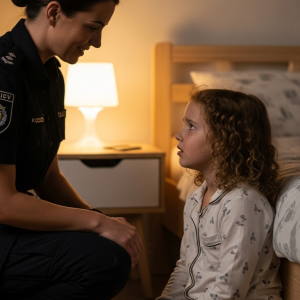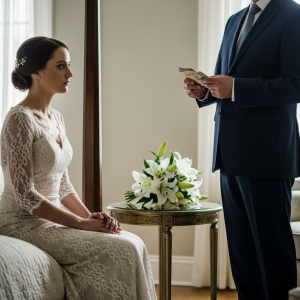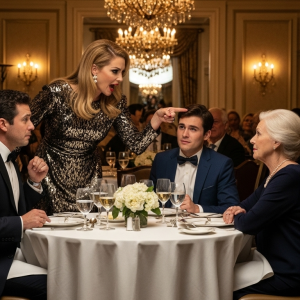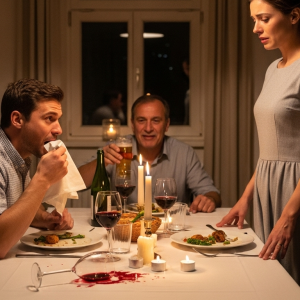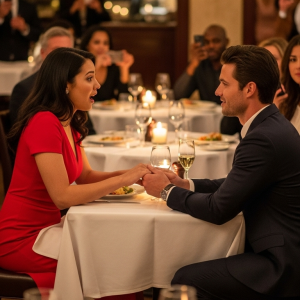“She’s not your real grandma.”
The words, sharp and cruel, sliced through the warm evening air of our family trip. My daughter-in-law, Lyra, spat them at my grandson. From the porch, I watched, and for the first time in three long years, a genuine smile touched my lips. This was the moment I had been waiting for.
My name is Lorna, and at seventy years old, I was about to prove that the quietest person in the room is often the most powerful. I had meticulously crafted a three-year performance of poverty and dependence, and Lyra’s casual cruelty was the final data point I needed.
My eight-year-old grandson, Lance, looked up from his toy cars, his small face a canvas of confusion. “What do you mean, Mom?”
Lyra stood silhouetted in the cabin doorway, hands on her hips. The afternoon’s wine had pried open the cage of her usual, more calculated disdain. “I mean she’s just your father’s mother, honey. Not truly family, like us. We just… have to take care of her.”
My son, Kent, appeared behind her, his voice heavy with the familiar tone of exhausted annoyance. “Lorna, she didn’t mean anything by it.” He always defended her, even when her actions were indefensible. But instead of the usual sting of humiliation, a profound sense of relief washed over me. The test was complete.
“Oh, I know exactly what Lyra meant,” I said, my voice surprisingly steady. “And it’s perfectly fine.”
Lance scrambled onto my lap, his arms wrapping around my neck in a hug of pure, uncomplicated love. “You’re my real grandma, Nana. I don’t care what Mom says.” I caught Lyra rolling her eyes, a gesture that confirmed everything. This woman wasn’t just dismissive; she was actively poisoning my grandson against me.
“Lance, come inside,” she commanded. “Wash up for dinner. And don’t get your clothes dirty on that… old thing.” She meant me.
As Lance trudged inside, my phone buzzed. It was my attorney, Richard. All preparations complete. Are you ready to proceed?
I typed back a single, decisive word. Tonight.
Three years ago, when my husband Henry passed, I made a choice. We had lived a simple life, clipping coupons and driving old cars. No one knew that through decades of quiet, meticulous investing—starting with a small inheritance I never mentioned—I had built a fortune. By the time Henry died, our net worth had eclipsed fifty million dollars.
But watching Kent and Lyra at the funeral, I saw something that worried me. I saw impatience disguised as grief. Two weeks later, they sat in my kitchen and laid out my future.
“Mom, we need to talk about your situation,” Kent had said, unable to meet my eyes.
Lyra, ever the pragmatist, jumped in. “Your financial situation. Kent says Dad didn’t leave much. You can’t afford this house.” Her plan was simple: I would sell my home, move into an “affordable” senior community, and use the proceeds to support myself so I wouldn’t be a burden.
In that moment, the test began. I played the part of the destitute widow perfectly. I sold the house—to a holding company I secretly owned—and moved into a small rental apartment in a building that was also mine. I let them believe I was struggling, that every dollar was precious.
Their compassion withered almost immediately. Phone calls from Kent grew shorter. Invitations to family events dwindled, Lyra citing the “burden” of my inability to contribute financially. She framed my exclusion as an act of kindness, protecting me from the embarrassment of my own poverty, all while systematically erasing me from Lance’s life.
I overheard her once, telling him, “Nana can’t come to your school play, honey. She can’t afford the gas money.” I could have chartered a private jet. Instead, I stayed home and cataloged another piece of evidence.
The cruelty was in the details. The paper plates at dinner while they used fine china. The lumpy pullout couch on this very vacation. And now, the ultimate betrayal: teaching my grandson that I was not real family. She wasn’t just neglecting a relationship; she was actively demolishing it.
Lying on that uncomfortable couch, listening to my family sleep in their warm beds, I felt a surge of anticipation. Tonight, the performance would end.
The next day, a strange energy coursed through me. During our hike to the lake, I kept pace easily, shedding the frail persona I had worn for three years.
“Nana, you’re walking really fast,” Lance observed, his little legs pumping to keep up.
Kent looked back, a flicker of confusion on his face. “Mom, are you sure you’re okay? You seem… different.” If only he knew.
At the lake, Lyra orchestrated her perfect family photos, carefully angling the camera to exclude me from every shot. In their documented history, I was an invisible woman. It no longer hurt; it simply amused me. By tomorrow, they would be desperately searching for a photo with me in it.
That afternoon, I made my move. “I’ve been thinking,” I announced brightly. “We should have a special dinner tonight. My treat. I’ll cook.”
Kent looked tired. “Mom, we were just going to order pizza.”
Lyra’s eyes narrowed with suspicion. My usual apologetic gratitude was gone, replaced by something she couldn’t identify. “You don’t need to go to all that trouble. The kitchen here is tiny.”
“I’ll manage,” I assured her, my smile unwavering. “I’m far more resourceful than people give me credit for.”
That evening, I prepared a meal that silently screamed of my true financial status. Prime ribeye steaks, roasted asparagus with truffle oil, and a rich chocolate torte. The ingredients had cost more than their weekly grocery budget.
As they took their first bites, their expressions shifted from surprise to outright confusion. “This is incredible, Mom,” Kent said. “When did you learn to cook like this?”
“I’ve always cooked like this,” I replied softly. “You just stopped paying attention.”
Lyra’s suspicion finally boiled over. “Where did you get these steaks? They must have been terribly expensive.”
“I found them on sale,” I lied smoothly one last time. “Sometimes, you just get lucky.” I took a sip of the vintage Bordeaux I had opened—a stark contrast to the cheap box wine I usually brought. “Actually,” I said, setting my glass down. “I think it’s time we had an honest conversation. About luck, money… and family.”
The clatter of silverware ceased. Three pairs of eyes fixed on me, sensing the seismic shift in the room’s atmosphere.
“Mom,” Kent said carefully. “What are you getting at?”
“I’m getting at the fact that for three years, you have all been operating under a significant misunderstanding about my situation.” I reached into my purse, retrieved a tablet, and slid it to the center of the table. On the screen was the summary page of my investment portfolio.
The number glowed in the dim light: $52,347,891.
Kent’s jaw fell open. Lyra leaned forward, her face paling as she stared at the screen. “That’s… that’s impossible,” she whispered, as if her denial could will the number away.
“The investments are real,” I said calmly. “The real estate is real. The trust accounts are real. The only thing that wasn’t real was the poverty I’ve been performing for the past three years.”
“Performing?” Kent’s voice was a choked whisper.
“A test,” I stated, my voice cutting through the silence. “A three-year test to see who my family truly was when you believed I had nothing to offer. And you failed. Spectacularly.”
Lyra shot to her feet, her chair crashing backward. “This is insane! You can’t just lie to us for three years and act like we’re the villains!”
“Can’t I?” I asked, my gaze unflinching. “I simply allowed you to reveal who you are. I watched you treat me like a burden. I watched you teach my grandson that love is conditional on what someone can provide you.”
The word ‘love’ seemed to hang in the air, an indictment of everything they had done.
“Yesterday,” I continued, my voice cold and precise, “when you told Lance I wasn’t his real grandmother, you confirmed everything. You aren’t just thoughtless; you actively work to destroy relationships that don’t serve you.”
Lyra’s breathing grew rapid and shallow. Her face, a mask of disbelief and horror, cycled through shades of white and red. “I… I think I’m going to be sick…”
And then, in a moment of dramatic finality that I could never have planned, her eyes rolled back into her head. She crumpled to the floor in a dead faint.
Kent rushed to his unconscious wife’s side, but I remained seated, calmly sipping my wine. When Lyra finally came to ten minutes later, the first thing she saw was my unwavering, composed face. The nightmare was real.
“You have fifty-two million dollars,” she said, her voice a hollow echo of her usual authority.
“As of this morning’s market close,” I corrected her, the precision a fresh wound.
Kent helped her into a chair. He looked broken, the full weight of his failure crashing down on him. “Why, Mom? Why would you do this?”
“Because I needed to know what kind of people were influencing my grandson,” I said, my voice devoid of pity. I pulled a thick envelope from my purse and placed it on the table between them. “And now that I know, I have made some decisions.”
I laid out the documents one by one. The first was my revised will. “My entire estate will be placed in a trust for Lance, accessible on his 25th birthday. The trustees will be my attorney and a financial firm. Not family.”
Lyra made a small, wounded sound.
“There are conditions,” I continued, looking directly at Kent. “Lance only inherits if he maintains a genuine, unimpeded relationship with me. If I find either of you have poisoned him against me or prevented him from seeing me, every last cent goes to charity.”
“You can’t do that,” Lyra whispered.
“I can and I have,” I said. The next document outlined my immediate plans. “I’m moving. I’ve purchased a house two hours away. Far enough that visits will require a deliberate effort. If you want a relationship with me from now on, you will have to earn it.”
Kent finally held his head in his hands. “What do you want from us?” he asked, his voice muffled.
“I want you to live with the consequences of your choices,” I said. “For three years, you assumed I had no power. You were wrong. My love for Lance is unconditional, but my financial support for people who have shown me nothing but disdain? That has ended.”
I stood up, the matriarch of a family I was breaking apart only to rebuild on a foundation of truth. “You have tonight to discuss it. In the morning, you can tell me if you accept my terms.”
The next morning, Kent met me on the porch. He looked like he’d aged a decade overnight. “We accept your terms,” he said, his voice raw. “All of them.” Then, his composure broke. “I failed you, Mom. As a son, I completely failed you.”
The confession was what I had waited for, but it brought no joy, only a profound sadness for what we had lost. “You failed yourself, Kent. You let your wife teach our family that kindness was a transaction.”
“Can you forgive me?” he pleaded, tears streaming down his face.
“Forgiveness doesn’t erase consequences,” I said gently, but firmly. “The past three years happened. Now, you must prove you’ve changed through consistent, respectful action.”
Six months later, life found a new rhythm. My new house was a sanctuary. Kent visited every other weekend, making a genuine effort to rebuild our bond. Lyra came occasionally, her demeanor a careful, cautious politeness. It wasn’t warmth, but it was respect, and for now, it was enough.
The real victory was Lance. Free from his mother’s subtle manipulations, our relationship blossomed. We planted an herb garden, baked cookies, and he learned the family history his mother had never cared to ask about.
“Nana,” he asked me one afternoon, his hands deep in the soil. “Mom says you’re really rich. Is that true?”
I smiled. “I am, sweetheart. Does that change anything?”
He thought for a moment. “No. You still build the best rock castles. Money doesn’t change who you are inside.”
“Exactly right,” I said, my heart swelling. “It just reveals who other people are.”
The test was over. The results were permanent. My family was not perfect, but it was finally honest. I had refused to be diminished, and in doing so, I had reclaimed not just my dignity, but the future of my family, on my own terms. The performance was over, and the truth had, at last, set us all free.
